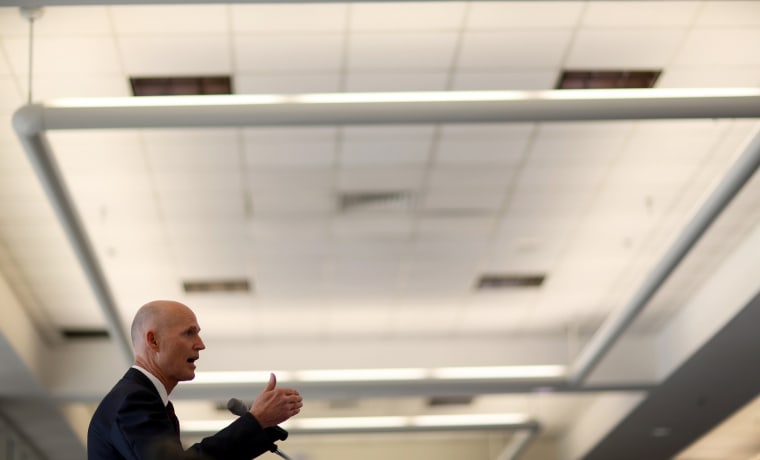Perhaps the lesson to be learned is that gubernatorial candidates should be cautious when pledging how many jobs they'll create. In Wisconsin, Scott Walker (R)
vowed as a candidate to create 250,000 jobs in his first term -- and after three years in office, it's clear Walker will come
nowhere near fulfilling his pledge.
In Florida, Rick Scott was even more ambitious, assuring voters statewide in 2010 that he had a plan to create 700,000 jobs if elected. The
Miami Herald and
Tampa Bay Times conducted
a very thorough review of the Republican governor's record on job creation and found that the promises have gone largely unmet.
Gov. Rick Scott has staked his political future on his ability to bring jobs to Florida, but the first comprehensive review of his efforts shows few successes and hundreds of unfulfilled promises. The Miami Herald and Tampa Bay Times reviewed public information for 342 job-creation deals that involve various tax breaks since Scott took office in 2011. Among the findings: Of the jobs Scott can influence most, only a fraction now exist. Scott has pledged $266 million in tax breaks and other incentives in return for 45,258 new jobs. But 96 percent of the jobs have yet to materialize, according to state data.
In fairness to the governor, it's worth emphasizing that Florida's unemployment rate has dropped since the 2010 elections. But in context, nearly every state's unemployment rate is lower now than three years ago, and Florida's results largely mirror the national trends, making it more difficult for Scott to claim bragging rights.
And more to the point, as the Herald/Times research documents extremely well, Scott implemented a specific policy agenda that he insisted would prove effective in creating jobs -- relying largely on tax breaks -- which hasn't worked well at all.
To understand Scott's influence on Florida's jobs picture, the Herald and Times examined the deals that the governor could most affect: projects where the state offers economic incentives such as cash grants and tax refunds. Reporters spent more than six months examining publicly available information on 342 jobs deals crafted since Scott took office. The Herald and Times also requested information from the state Department of Economic Opportunity, an agency Scott created in 2011 to oversee incentive programs.
The detailed report documents a series of instances in which the Republican governor tried to implement his job-creation ideas, to no avail. "For hundreds of other projects, the state website that tracks jobs data, Floridajobs.org, shows the same number of jobs created during Scott's tenure: 0."
Scott's office said the jobs are still expected to materialize eventually, arguing that it'll just take more time. Whether Floridians are inclined to give their unpopular governor more time remains to be seen, though I suspect Charlie Crist and other in-state Democrats will make this a key campaign issue over the next 11 months.
